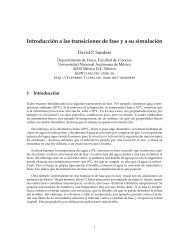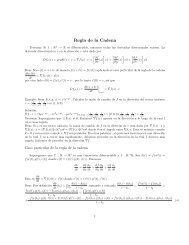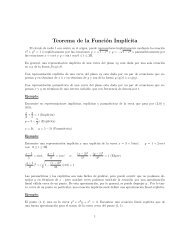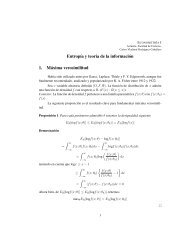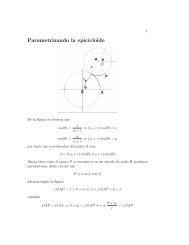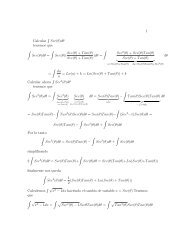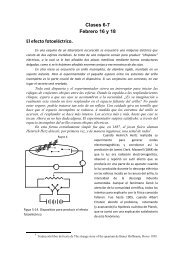"Surely You're Joking, Mr. Feynman!" - unam.
"Surely You're Joking, Mr. Feynman!" - unam.
"Surely You're Joking, Mr. Feynman!" - unam.
You also want an ePaper? Increase the reach of your titles
YUMPU automatically turns print PDFs into web optimized ePapers that Google loves.
the two piles of hay, with the extra complication that as soon as he moves toward one, the<br />
other one gets higher. That makes it very difficult!<br />
The argument that finally convinced me was my sabbatical leave. I wanted to go<br />
to Brazil again, this time for ten months, and I had just earned my sabbatical leave from<br />
Cornell. I didn't want to lose that, so now that I had invented a reason to come to a<br />
decision, I wrote Bacher and told him what I had decided.<br />
Caltech wrote back: "We'll hire you immediately, and we'll give you your first<br />
year as a sabbatical year." That's the way they were acting: no matter what I decided to<br />
do, they'd screw it up. So my first year at Caltech was really spent in Brazil. I came to<br />
Caltech to teach on my second year. That's how it happened.<br />
Now that I have been at Caltech since 1951, I've been very happy here. It's exactly<br />
the thing for a onesided guy like me. There are all these people who are close to the top,<br />
who are very interested in what they are doing, and who I can talk to. So I've been very<br />
comfortable.<br />
But one day, when I hadn't been at Caltech very long, we had a bad attack of<br />
smog. It was worse then than it is now at least your eyes smarted much more. I was<br />
standing on a corner, and my eyes were watering, and I thought to myself, "This is crazy!<br />
This is absolutely INSANE! It was all right back at Cornell. I'm getting out of here."<br />
So I called up Cornell, and asked them if they thought it was possible for me to<br />
come back. They said, "Sure! We'll set it up and call you back tomorrow."<br />
The next day, I had the greatest luck in making a decision. God must have set it<br />
up to help me decide. I was walking to my office, and a guy came running up to me and<br />
said, "Hey, <strong>Feynman</strong>! Did you hear what happened? Baade found that there are two<br />
different populations of stars! All the measurements we had been making of the distances<br />
to the galaxies had been based on Cephid variables of one type, but there's another type,<br />
so the universe is twice, or three, or even four times as old as we thought!"<br />
I knew the problem. In those days, the earth appeared to be older than the<br />
universe. The earth was four and a half billion, and the universe was only a couple, or<br />
three billion years old. It was a great puzzle. And this discovery resolved all that: The<br />
universe was now demonstrably older than was previously thought. And I got this<br />
information right away the guy came running up to me to tell me all this.<br />
I didn't even make it across the campus to get to my office, when another guy<br />
came up Matt Meselson, a biologist who had minored in physics. (I had been on his<br />
committee for his Ph.D.) He had built the first of what they call a density gradient<br />
centrifuge it could measure the density of molecules. He said, "Look at the results of<br />
the experiment I've been doing!"<br />
He had proved that when a bacterium makes a new one, there's a whole molecule,<br />
intact, which is passed from one bacterium to another a molecule we now know as<br />
DNA. You see, we always think of everything dividing, dividing. So we think everything<br />
in the bacterium divides and gives half of it to the new bacterium. But that's impossible:<br />
Somewhere, the smallest molecule that contains genetic information can't divide in half;<br />
it has to make a copy of itself, and send one copy to the new bacterium, and keep one<br />
copy for the old one. And he had proved it in this way: He first grew the bacteria in heavy<br />
nitrogen, and later grew them all in ordinary nitrogen. As he went along, he weighed the<br />
molecules in his density gradient centrifuge.<br />
The first generation of new bacteria had all of their chromosome molecules at a



